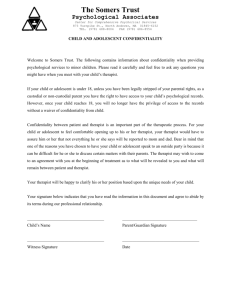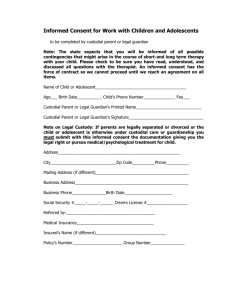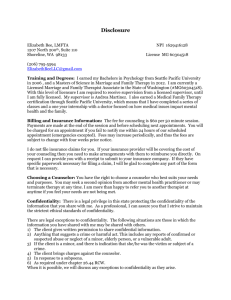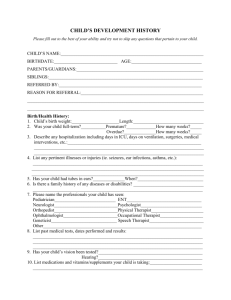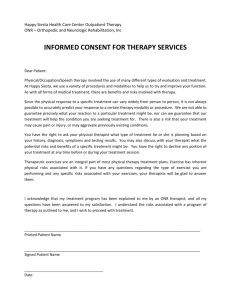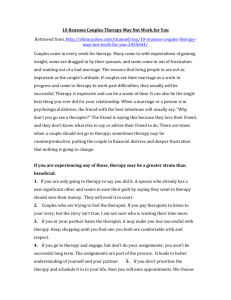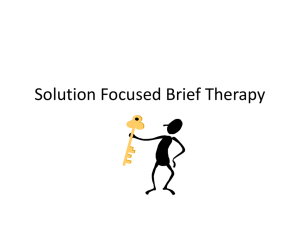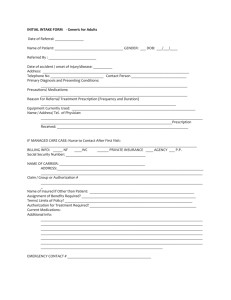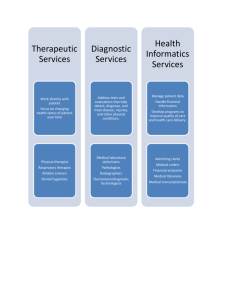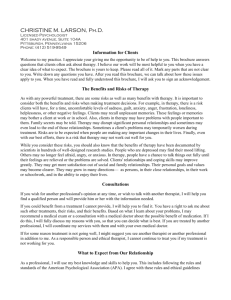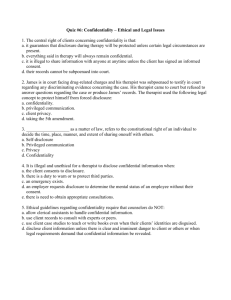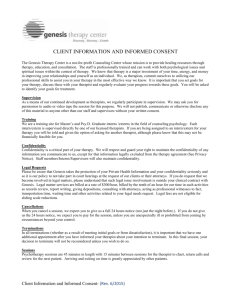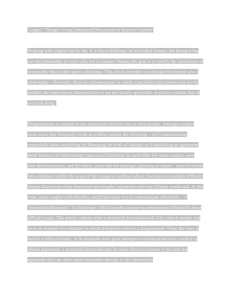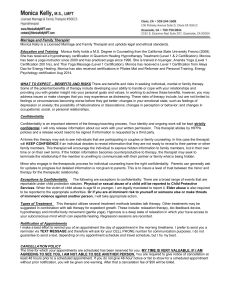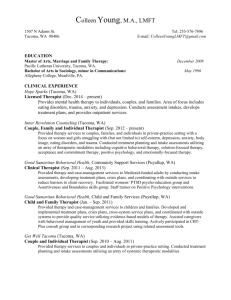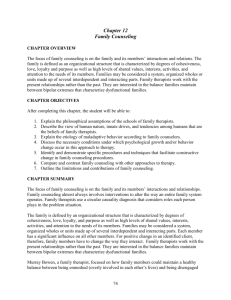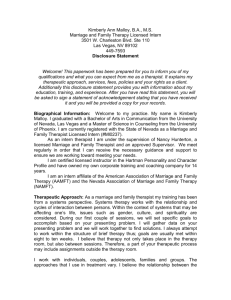Disclosure statement & information
advertisement
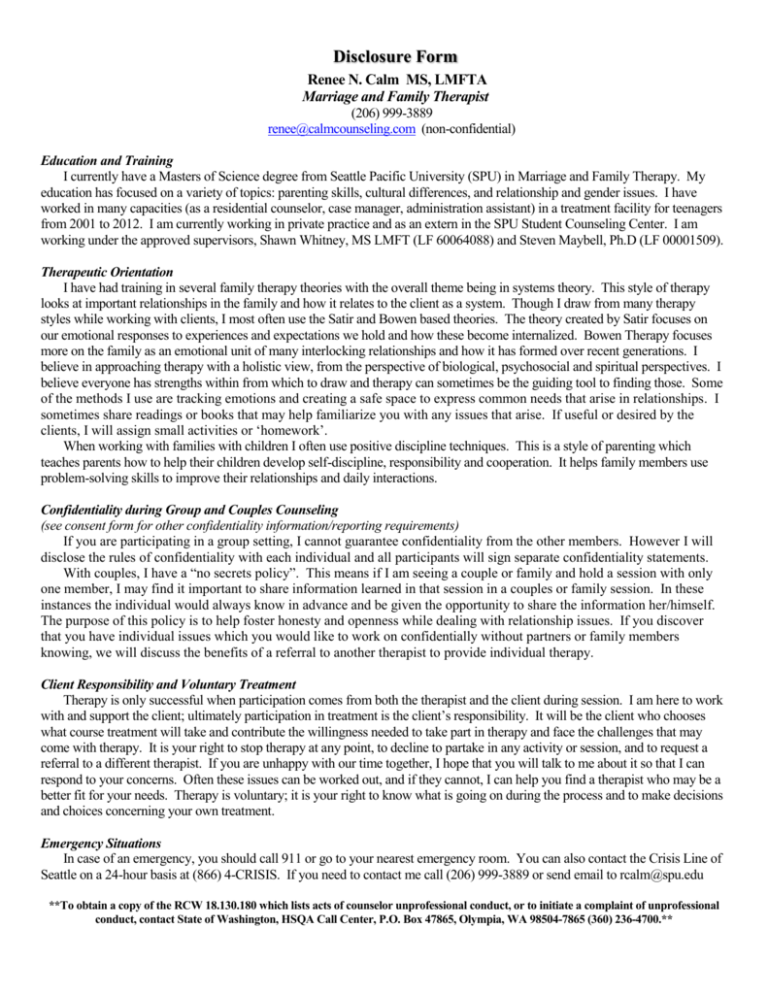
Disclosure Form Renee N. Calm MS, LMFTA Marriage and Family Therapist (206) 999-3889 renee@calmcounseling.com (non-confidential) Education and Training I currently have a Masters of Science degree from Seattle Pacific University (SPU) in Marriage and Family Therapy. My education has focused on a variety of topics: parenting skills, cultural differences, and relationship and gender issues. I have worked in many capacities (as a residential counselor, case manager, administration assistant) in a treatment facility for teenagers from 2001 to 2012. I am currently working in private practice and as an extern in the SPU Student Counseling Center. I am working under the approved supervisors, Shawn Whitney, MS LMFT (LF 60064088) and Steven Maybell, Ph.D (LF 00001509). Therapeutic Orientation I have had training in several family therapy theories with the overall theme being in systems theory. This style of therapy looks at important relationships in the family and how it relates to the client as a system. Though I draw from many therapy styles while working with clients, I most often use the Satir and Bowen based theories. The theory created by Satir focuses on our emotional responses to experiences and expectations we hold and how these become internalized. Bowen Therapy focuses more on the family as an emotional unit of many interlocking relationships and how it has formed over recent generations. I believe in approaching therapy with a holistic view, from the perspective of biological, psychosocial and spiritual perspectives. I believe everyone has strengths within from which to draw and therapy can sometimes be the guiding tool to finding those. Some of the methods I use are tracking emotions and creating a safe space to express common needs that arise in relationships. I sometimes share readings or books that may help familiarize you with any issues that arise. If useful or desired by the clients, I will assign small activities or ‘homework’. When working with families with children I often use positive discipline techniques. This is a style of parenting which teaches parents how to help their children develop self-discipline, responsibility and cooperation. It helps family members use problem-solving skills to improve their relationships and daily interactions. Confidentiality during Group and Couples Counseling (see consent form for other confidentiality information/reporting requirements) If you are participating in a group setting, I cannot guarantee confidentiality from the other members. However I will disclose the rules of confidentiality with each individual and all participants will sign separate confidentiality statements. With couples, I have a “no secrets policy”. This means if I am seeing a couple or family and hold a session with only one member, I may find it important to share information learned in that session in a couples or family session. In these instances the individual would always know in advance and be given the opportunity to share the information her/himself. The purpose of this policy is to help foster honesty and openness while dealing with relationship issues. If you discover that you have individual issues which you would like to work on confidentially without partners or family members knowing, we will discuss the benefits of a referral to another therapist to provide individual therapy. Client Responsibility and Voluntary Treatment Therapy is only successful when participation comes from both the therapist and the client during session. I am here to work with and support the client; ultimately participation in treatment is the client’s responsibility. It will be the client who chooses what course treatment will take and contribute the willingness needed to take part in therapy and face the challenges that may come with therapy. It is your right to stop therapy at any point, to decline to partake in any activity or session, and to request a referral to a different therapist. If you are unhappy with our time together, I hope that you will talk to me about it so that I can respond to your concerns. Often these issues can be worked out, and if they cannot, I can help you find a therapist who may be a better fit for your needs. Therapy is voluntary; it is your right to know what is going on during the process and to make decisions and choices concerning your own treatment. Emergency Situations In case of an emergency, you should call 911 or go to your nearest emergency room. You can also contact the Crisis Line of Seattle on a 24-hour basis at (866) 4-CRISIS. If you need to contact me call (206) 999-3889 or send email to rcalm@spu.edu **To obtain a copy of the RCW 18.130.180 which lists acts of counselor unprofessional conduct, or to initiate a complaint of unprofessional conduct, contact State of Washington, HSQA Call Center, P.O. Box 47865, Olympia, WA 98504-7865 (360) 236-4700.**
